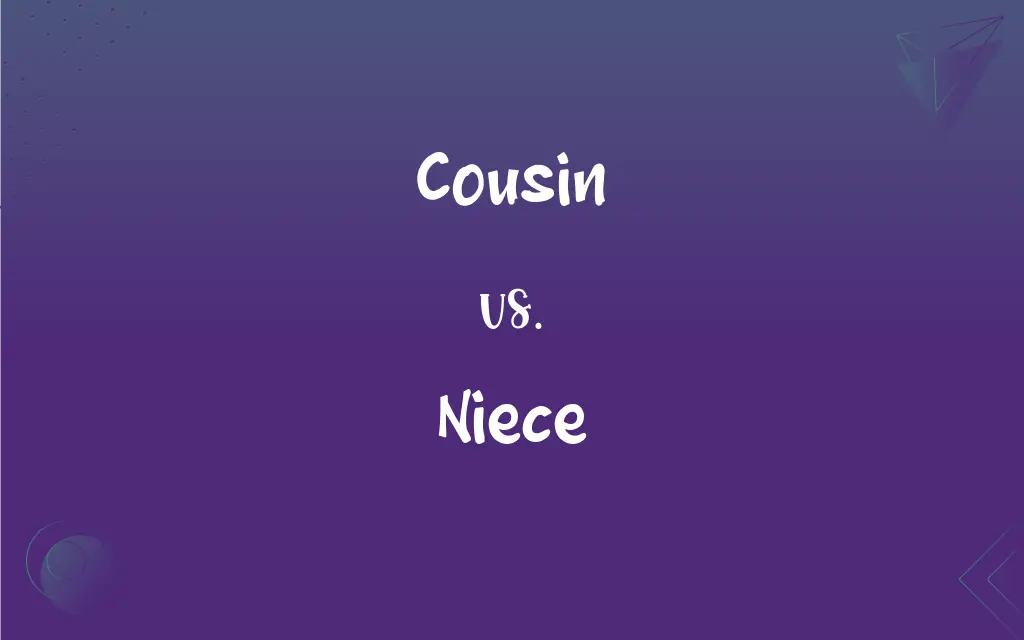Cousin vs. Niece: What's the Difference?
Edited by Aimie Carlson || By Janet White || Updated on September 26, 2023
A cousin is a child of one's aunt or uncle, while a niece is the daughter of one's sibling or sibling-in-law. Both terms denote familial relationships but differ in the nature of the relationship.

Key Differences
"Cousin" and "Niece" are terms that refer to specific familial relationships. A cousin is a relative who is a child of one's aunt or uncle. This relationship is more lateral, representing a connection through one's parents and their siblings. In contrast, a niece is the daughter of one's sibling or sibling-in-law. The relationship with a niece is more direct, symbolizing a connection through one’s immediate family, namely, siblings.
The concept of a cousin is relatively broad and can extend to various degrees and types, such as first cousins, second cousins, and so on, depending on the common ancestor. This term encompasses a wide range of familial connections. Conversely, the term "niece" is more specific and does not include varied degrees or types, offering a clear and straightforward definition of the relationship, directly linked to one’s brother or sister.
In familial gatherings, interactions with cousins and nieces might differ due to the distinct nature of the relationships. Cousins, being more lateral relatives, may share similar family experiences and backgrounds, providing a sense of peer companionship. Nieces, however, represent a more vertical relationship, where one might assume a more protective or mentorship role, given the direct lineage from siblings.
While both cousin and niece represent familial bonds, they imply different levels of closeness and responsibility within a family structure. A cousin, being a more distant relative, may not necessitate the same level of obligation as a niece, to whom one might feel a stronger sense of duty and affection due to the immediate family connection through a sibling.
In family trees, the representation of cousins and nieces varies. Cousins appear in the family tree connected through aunts and uncles, symbolizing extended family. In contrast, nieces are depicted directly under siblings, reflecting a closer and more immediate family connection, aligning with the siblings’ offspring.
ADVERTISEMENT
Comparison Chart
Definition
Child of one's aunt or uncle.
Daughter of one's sibling or sibling-in-law.
Relationship Type
Lateral.
Vertical.
Degrees
Has various degrees (first, second, etc.).
No degrees.
Closeness
Generally more distant.
Generally closer due to immediate family connection.
Family Tree Representation
Connected through aunts and uncles.
Directly under siblings.
ADVERTISEMENT
Cousin and Niece Definitions
Cousin
Someone related by blood or marriage through aunts and uncles.
My cousin, by marriage, is coming for a visit.
Niece
Represents a younger generation in the family.
My niece is learning our family traditions.
Cousin
A family member connected through common grandparents.
We discovered that we were third cousins.
Niece
The daughter of one’s sibling or sibling-in-law.
My niece has my sister’s eyes.
Cousin
A term denoting a lateral familial relationship.
Our family gatherings are full of my cousins.
Niece
A direct vertical familial relation through siblings.
I always buy gifts for my niece on her birthday.
Cousin
A relative who is a child of one’s aunt or uncle.
My cousin and I share a love for hiking.
Niece
A relative to whom one may have a duty of care.
I look after my niece while her parents are away.
Cousin
A representative of extended family.
Meeting distant cousins can reveal unknown family history.
Niece
A close family member from the immediate family lineage.
Teaching my niece to bake was a joyous experience.
Cousin
A child of one's aunt or uncle. Also called first cousin.
Niece
The daughter of one's brother or sister or of the brother or sister of one's spouse.
Cousin
A relative descended from a common ancestor, such as a grandparent, by two or more steps in a diverging line.
Niece
A daughter of one’s sibling, brother-in-law, or sister-in-law; either the daughter of one's brother ("fraternal niece"), or of one's sister ("sororal niece").
My niece just celebrated her 15th birthday.
Cousin
A relative by blood or marriage; a kinsman or kinswoman.
Niece
A relative, in general; especially, a descendant, whether male or female; a granddaughter or a grandson.
Cousin
A member of a kindred group or country
Our Canadian cousins.
Niece
A daughter of one's brother or sister, or of one's brother-in-law or sister-in-law. In modern English, this is the primary meaning.
Cousin
Something similar in quality or character
"There's no mistaking soca for its distant Jamaican cousin, reggae" (Michael Saunders).
Niece
A daughter of your brother or sister
Cousin
Used as a form of address by a sovereign in addressing another sovereign or a high-ranking member of the nobility.
Cousin
The child of a person's uncle or aunt; a first cousin.
I think my cousin is a good man.
Cousin
(archaic) A kinsman.
Cousin
Any relation who is not a direct ancestor or descendant but part of one's extended family; one more distantly related than an uncle, aunt, granduncle, grandaunt, nephew, niece, grandnephew, grandniece, etc.
Cousin
(obsolete) A title formerly given by a king to a nobleman, particularly to those of the council. In English writs, etc., issued by the crown, it signifies any earl.
Cousin
(figurative) Something kindred or related to something else.
Cousin
A member of the British intelligence services (from an American perspective) or of the American intelligence services (from a British perspective).
Cousin
One collaterally related more remotely than a brother or sister; especially, the son or daughter of an uncle or aunt.
Thou art, great lord, my father's sister's son,A cousin-german to great Priam's seed.
Cousin
A title formerly given by a king to a nobleman, particularly to those of the council. In English writs, etc., issued by the crown, it signifies any earl.
My noble lords and cousins, all, good morrow.
Cousin
Allied; akin.
Cousin
The child of your aunt or uncle
FAQs
Is a cousin considered a lateral relative?
Yes, a cousin is considered a lateral relative, connected through aunts and uncles.
Can the term cousin refer to various degrees of relationships?
Yes, the term cousin can refer to first cousins, second cousins, etc., depending on the shared ancestor.
Is the term niece specific and without degrees?
Yes, the term niece is specific and does not have degrees like the term cousin does.
Does a niece represent an immediate family connection?
Yes, a niece represents an immediate family connection, being a direct descendant of one's siblings.
Can cousin relationships provide peer companionship?
Yes, cousin relationships can often offer a sense of peer companionship due to shared family backgrounds and experiences.
What is the relationship of a niece?
A niece is the daughter of one’s sibling or sibling-in-law.
Are the relationships with cousins generally more distant?
Generally, yes. Cousins are usually considered more distant relatives compared to nieces.
Is a cousin a child of an aunt or uncle?
Yes, a cousin is the child of one's aunt or uncle.
Is a niece considered a vertical relative?
Yes, a niece is considered a vertical relative as she is the daughter of one’s sibling or sibling-in-law.
Can relationships with nieces involve mentorship roles?
Yes, relationships with nieces often involve taking on protective or mentorship roles due to the vertical family connection.
Does a cousin represent an extended family?
Yes, cousins are part of the extended family, related through common grandparents.
Can the term cousin also apply to relatives by marriage?
Yes, the term cousin can apply to relatives connected by marriage, known as cousins by marriage.
Do cousins appear in family trees connected through aunts and uncles?
Yes, cousins appear in family trees connected through the branches of aunts and uncles.
Are the relationships with nieces generally closer?
Yes, relationships with nieces are generally closer due to the direct familial connection through siblings.
Are nieces depicted directly under siblings in family trees?
Yes, nieces are depicted directly under siblings in family trees, representing a closer family connection.
About Author
Written by
Janet WhiteJanet White has been an esteemed writer and blogger for Difference Wiki. Holding a Master's degree in Science and Medical Journalism from the prestigious Boston University, she has consistently demonstrated her expertise and passion for her field. When she's not immersed in her work, Janet relishes her time exercising, delving into a good book, and cherishing moments with friends and family.
Edited by
Aimie CarlsonAimie Carlson, holding a master's degree in English literature, is a fervent English language enthusiast. She lends her writing talents to Difference Wiki, a prominent website that specializes in comparisons, offering readers insightful analyses that both captivate and inform.































































